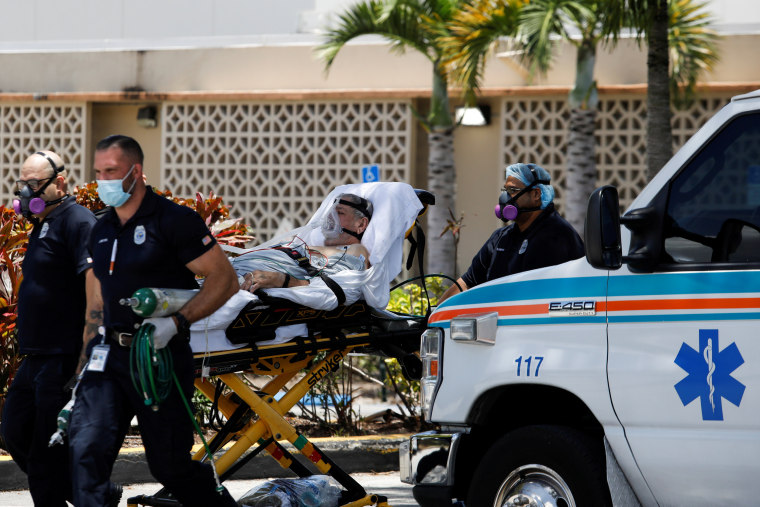The silver lining as the United States stands poised to record the 200,000th coronavirus fatality is that the rate at which people are dying of Covid-19 has slowed in the last two weeks, new NBC News figures revealed Monday.
The 11,015 deaths recorded between Aug. 30 and Sept. 13 were 17 percent less than the previous two weeks' total of 13,244, the figures showed.
“It may be a statistical blip, it may be because the treatment is getting better, or it may be because the patients have been getting younger,” said Dr. Sadiya Khan, an epidemiologist at the Northwestern University Feinberg School of Medicine.
Most of the dead thus far have been the elderly and the infirm, but hundreds of new cases in recent weeks have been students who contracted the virus after returning to classes on college campuses.
Currently, some 20 percent of the cases in intensive care units are people between the ages of 18 and 34 whose chances of survival are better than those for the elderly or already ill people, Khan said.
Also, the weekly death toll numbers have gone up and down repeatedly during the crisis, the NBC News figures show.
But seven months after President Donald Trump privately told reporter Bob Woodward that the coronavirus was “deadly stuff,” the U.S. continued to lead the world with 195,337 deaths and 6.5 million confirmed cases of coronavirus.
Right now, the U.S. accounts for over a fifth of the world's 925,596 fatalities and a fifth of the more than 29 million cases, according to the Johns Hopkins University Covid-19 dashboard.
Trump has denied lying about the severity of the pandemic to the American public. And despite the increasingly grim numbers, he has repeatedly praised his administration’s response to the crisis that has wrecked the economy and continues to claim at least 800 or so lives a day in the U.S.
Meanwhile, the Institute for Health Metrics and Evaluation at the University of Washington, a research outfit whose optimistic forecasts the Trump administration once touted, is projecting there could be over 400,000 deaths in the U.S. by Jan. 1.
The majority of the deaths were reported in March and April in the Northeast when local health officials were still trying to understand how the virus was transmitted and were struggling to find enough masks, ventilators and hospital beds to combat the crisis.
In recent months, most of the Covid-19 deaths have been in the Southern and the Sun Belt states that began reopening in May at the urging of Trump even as the number of cases began to spike in states such as Florida, Texas and Arizona.
And of late, South Dakota and neighboring Midwestern states have seen big increases in new cases with public health experts pointing the finger at the massive Sturgis motorcycle rally last month, where there was little or no mask-wearing or physical distancing, and the resumption of in-class education.
“Two things clearly appear to be driving it,” Khan told NBC News in an earlier interview. “The motorcycle rally in Sturgis, as well as students returning to college and universities. The timeline seems to support that.”
One death so far has been linked directly to the rally, a 60-something man in Minnesota who had been at the festival and had underlying conditions.
In other coronavirus news:
Woodward said on the "TODAY" show that he was shocked when he learned that Trump received on Jan. 28 a dire warning from his national security advisers about the dangers the nation faced from Covid-19. But Trump didn't share that information in his State of the Union address to Congress on Feb. 4, which 40 million people watched. "It is one of those shocks, for me, having written about nine presidents, that the president of the United States possessed the specific knowledge that could have saved lives and historians are going to be writing about the lost month of February for tens of years," Woodward said. Trump did not declare a national emergency until March 13 and continued to insist Covid-19 was no more dangerous than the flu and resisted wearing masks in public.
The annual Macy’s Thanksgiving Day Parade will go on this year, but it will be a pared-down event because of the pandemic. Gone are the marchers parading down the traditional 2.5-mile route through Manhattan while the crowds cheer them on. Instead, parade events will be staged over two days, the overall number of participants will be reduced by approximately 75 percent and "all participants will be appropriately socially distanced," Macy's said in a statement. “It will not be the same parade that we’re used to,” New York City Mayor Bill de Blasio said.
- A Trump-appointed federal judge in Pennsylvania ruled that Gov. Tom Wolf's pandemic restrictions were unconstitutional. Among other things, Wolf required people to stay at home, shuttered businesses and limited group gatherings. U.S. District Judge William Stickman said they were well-meaning "but even in an emergency, the authority of government is not unfettered." The judge's ruling came after several businesses and Republican lawmakers sued Wolf, who is a Democrat. Stickman's ruling is unusual in that other Pennsylvania courts have consistently sided with Wolf. Also, most of the restrictions that Stickman objected too have already been lifted by Wolf.
- While U.S. lawmakers and police have been grappling with how to enforce mask-wearing mandates, the Jakarta Post is reporting that in Indonesia local authorities have come up with a jarring punishment for people caught not wearing them -- they're making them dig the graves of Covid-19 victims. So far eight people have been sentenced in the East Java province to this kind of hard labor. "There are only three gravediggers at the moment, so I thought I might as put these people to work with them," the local district head said.


